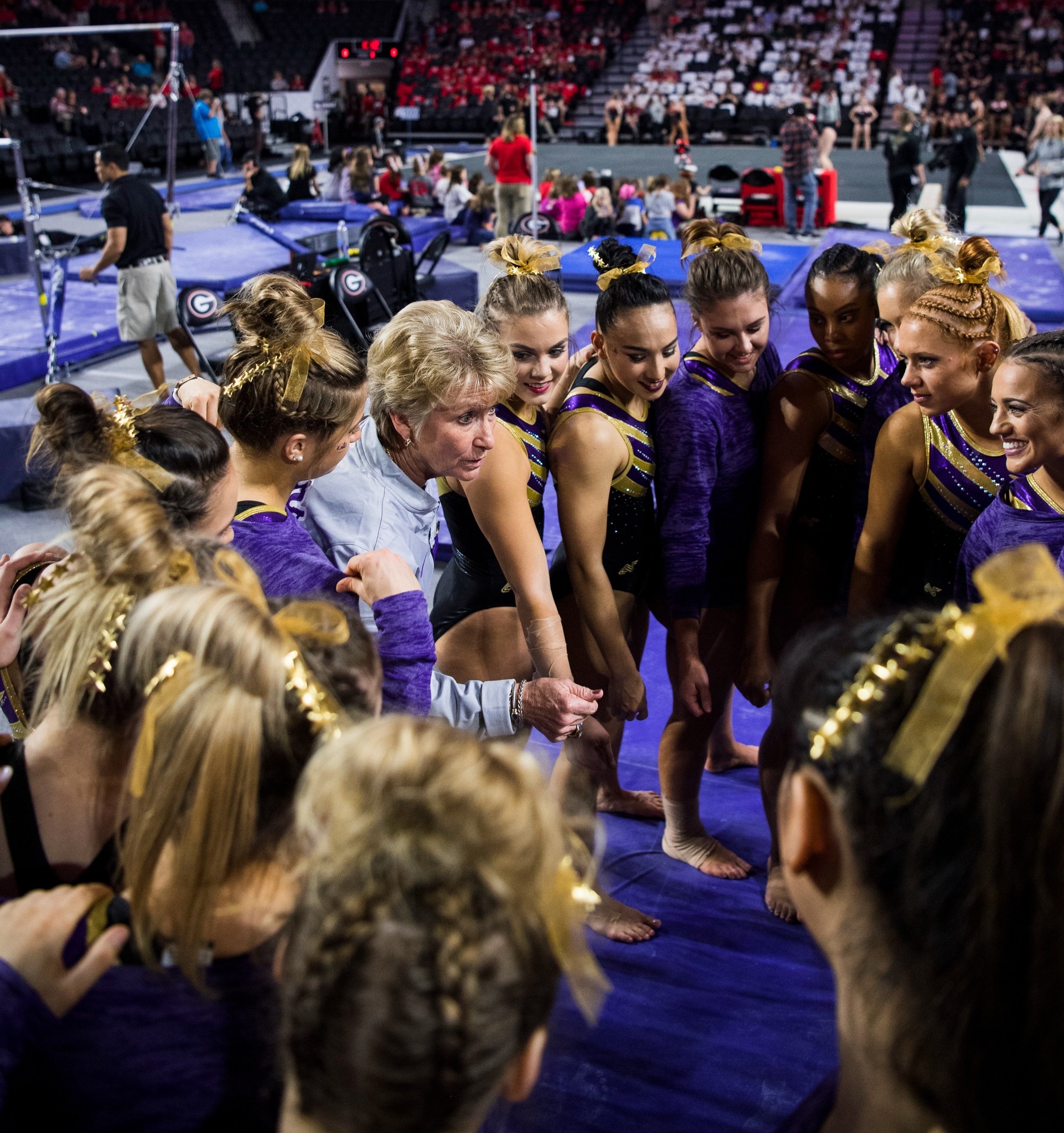On the Basis of Sex
With 2022 marking the 50th anniversary of Title IX, women and girls in sport across the world will find themselves reflecting on how far we have come, and where we still need to go.
In 1972, the law of Title IX prohibited sex-based discrimination in federally funded programs. Fifty years later, athletes who competed prior to the dawn of Title IX value the progress made, and how it has impacted the competing female athletes of today.
DD Breaux, the head coach of LSU Gymnastics for 43 seasons, can remember a time when there were essentially no girls’ programs for any sport, let alone any collegiate scholarships for women. Parents had to make significant financial and time sacrifices to give their daughters the slightest glimpse of what sport could be for them.
Coach DD Breaux taping ankle
“The price that people paid to find opportunities, you can’t even imagine,” Breaux stated. I competed for Southeastern’s club gymnastics team in high school because there were no programs elsewhere. From Donaldsonville to Baton Rouge, there was no bridge. We had to cross the river on a ferry.”
Once she became the coach of LSU Gymnastics in 1978, it became clear that Title IX did not solve everything. There were still powerful individuals with no interest in developing a women’s athletic program. The gymnasts trained in a corner of the fieldhouse and took 12-hour bus trips, while men’s teams had their own facilities and chartered flights.
Despite inequities, the source of hope was in realizing change would happen once there were shifts in power.
“People need to remember that we had a lot of adversity, and people who didn’t want women’s athletics to survive or thrive,” Breaux recalled. “They thought everything the women got was taking away from the men, which was not the case. We had great support some from incredible men: Dr. Bill Bankhead, Paul Murrill, and Ernie Hill. They really wanted the programs to thrive.”
Breaux especially attributes the growth of LSU’s women’s programs to Laura Leach, a former member of the board of supervisors, and former chancellor Paul Murrill. Both Leach and Murrill cared deeply about women’s sports, with Murrill insisting LSU would have them.
LSU Senior Soccer Player Shannon Cooke
“At the beginning, I didn’t know if I would have a program year to year,” Breaux recalled. “We went from fighting for mere existence every day to competing for a championship every year. It takes a village. You can’t do it by yourself.”
According to Breaux, institutions like LSU have started to nurture both male and female athletes to where they can compete at the highest level. While it was all formerly poured into football, basketball and baseball, every female athlete is starting to have a taste of equal opportunity.
For LSU Soccer player Shannon Cooke, the first time she set foot on LSU’s campus was also the first time she did not feel victimized by sex-based discrimination. A bit of a “late bloomer” on the pitch, Cooke remembers never being accepted by the boys, nor their parents, simply because she was a girl.
Once she made the England National Team and began missing class due to travel, boys made snarky comments about how she was often absent. They even went as far as trying to kick her legs out from under her in gym class because they did not want a girl to be better than them at soccer.
Over a decade later, becoming a collegiate athlete provided Cooke with the chance to receive treatment that far exceeds her expectations.
“Being at LSU where there’s a ton of athletes and soccer players, the sexism almost disappears for me,” Cooke said. “Now, I’m more confident in myself because I know I can play whatever I want without having to pay attention to boys’ opinion.”
Cooke can now focus on her game, and inspiring the next generation to believe they can do whatever they dream of doing.
Similar to what has transpired for Cooke, Breaux recognizes the importance of providing women with the opportunity to grow through sports. They can develop socially, academically and professionally, not just athletically.
Stephanie Rempe: LSU Deputy Athletics Director and former University of Arizona Volleyball Player
“Only in America can women receive scholarships to compete in their sport, and then go to medical school after,” Breaux said.
LSU Executive Deputy Athletic Director and COO Stephanie Rempe also values being able to witness the development of women as whole individuals through their sport.
“There is nothing that can develop a person like sports can,” Rempe stated. “To know that women have similar opportunities to men in celebrating wins, coping with losing, and learning discipline, it is remarkable.”
In Rempe’s mind, the past fifty years have allowed women to seize more opportunities to prove their excellence, which therefore results in more exposure and more community engagement with women’s athletics. To continue making strides, we must be willing to invest in female athletes and show that those in powerful positions value them.
“I think where we need to go is, we look at our international women’s soccer team and international men’s soccer team, or our men’s tennis team and women’s tennis team, and they’re equal,” Breaux said.





